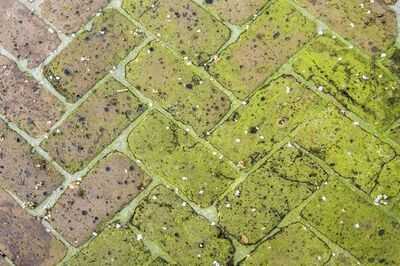
Green algae is a familiar sight on outdoor patios at this time of the year, with damp conditions allowing it to thrive.
The lingering moisture in the air from the cold and wet autumn weather, coupled with a lack of sunlight as the days get shorter, means that algae grows faster than normal and can spread across your patio before you know it. Porous surfaces like natural stone will soak up moisture which creates the ideal environment for algae to flourish, particularly after bouts of heavy rain, and what you're left with is a slippy, green patio that looks untidy and feels unsafe underfoot. But luckily there is an easy way to rid your patio of the unsightly green stuff in as little as five minutes and you only need two simple ingredients to do it. According to paving experts, you don't need harsh chemicals to give your patio a good clean, as a solution of white vinegar and orange peel will get the job done.
As vinegar is naturally acidic it can effectively kill and remove green algae, and it also doubles up as a good weed killer too. As for orange peels, the oil in the peel is a natural degreaser which helps to strip away the waxy coating from algae, and this ingredient has the added bonus of leaving your outdoor space smelling lovely and fresh too.
Paving experts at Reclaimed Brick Company explain: "Save citrus peels in a jar, cover with white vinegar, and leave for a week. Strain it, then dilute the liquid with warm water before use. The natural citrus oils help fight algae film and leave a fresh smell. The mild acidity loosens grime without harsh chemicals."
While this method takes a week to prepare, the paving experts claim it is the best natural method to use and leaves a smell that no harsh chemicals can achieve. And once the solution is made, it can clean your patio and rid it of green algae in as little as five minutes.
Explaining the process, experts at Reclaimed Brick Company said: "Sweep first to remove loose leaves, soil and grit. Pre-wet the patio with warm water. This helps the diluted spray spread evenly.
"Make the mix: one part strained citrus vinegar to four parts warm water. Test a small corner, then apply with a spray bottle or watering can. Scrub with a stiff outdoor brush in short strokes. Work in sections.
"Leave for 5 to 10 minutes so the suds can work on the film. Rinse well with clean water, guiding dirty water away from flower beds and drains."
The experts add: "Do not mix vinegar with bleach, ammonia, or any other cleaners. Never use strong acids on limestone or very soft sandstone; always test first and keep the mix mild.
"If using a pressure washer, avoid weak pointing, soft sandstone or old bricks because high pressure can blow out joints, open pores and leave striping.
"Regular cleaning prevents algae, moss, and grime from building up, which can make the area slippery and shorten the life of the paving.
"Simple care, such as sweeping leaves and washing the slabs with a gentle diluted citrus vinegar mix, keeps the space usable through the colder months and saves on bigger repairs later."
You may also like

Women's World Cup: Healy, Sutherland masterclass helps Australia rule over India

BSF foils cross-border smuggling bids, recovers five drones and pistol

NCB seizes drugs worth Rs 50 crore at Bengaluru airport

The underrated Christmas market that's 1 of UK's best - not Bath, York or Chester

US CDC layoff: Hundreds reinstated as 'incorrect notification' fired them, after Donadl Trump's vow to 'fire Democrats-aligned workers'






